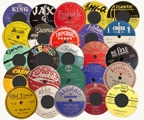 May 14, 2013
May 14, 2013 Who Needs a Record Label?
 There has never been a better time than now to be an independent artist. More easily and efficiently than ever, you can build a digital recording studio in your home, connect directly with fans through social media, and distribute your wares around the world through artist-friendly companies like CD Baby and Tunecore. It’s a DIY world, right? Thanks to powerful, affordable technology, you can cover the bases — from creation to marketing to distribution to retail — without anyone’s permission, entirely on your own.
There has never been a better time than now to be an independent artist. More easily and efficiently than ever, you can build a digital recording studio in your home, connect directly with fans through social media, and distribute your wares around the world through artist-friendly companies like CD Baby and Tunecore. It’s a DIY world, right? Thanks to powerful, affordable technology, you can cover the bases — from creation to marketing to distribution to retail — without anyone’s permission, entirely on your own.
So who needs a record label?
The short answer is that nobody needs a record label. The days when only a record label could introduce and expose an artist to the public are gone. If you can accomplish everything a label can — produce records, design packaging and promotions, create marketing plans, build relationships with writers, convince broadcasters to air your music, track your sales, and exploit licensing opportunities — then you essentially are a record label. You are an artist who happens to own and operate a label business.
The long answer depends on your goals as an artist. Do you want to run a label business? Do you have the knowledge and experience to run one? Are you comfortable diverting a large share of your time from creative to business activities? If so, setting up and running a label could be a good fit for you.
Either way, you need a creative team.
Maybe it’s a carefully chosen group of friends and acquaintances. Maybe it’s an established record label that understands your music and career goals. Either way, you have to identify your needs and meet them.
Putting Together a Creative Team
Whether you hire freelance help, sign to a label, or handle everything internally, you need to address five areas to realize your commercial potential as an independent artist.
 1) Production. Maybe you’ve built your own recording studio, maybe you book time at a commercial facility. In any case, take the time to learn how your vision translates from performance to recorded audio. The studio can be an integral part of the artistic process, as intrinsic to your sound as your voice, guitar, or piano. Work with an experienced engineer who can help you unlock the possibilities in mixing and mastering your music.
1) Production. Maybe you’ve built your own recording studio, maybe you book time at a commercial facility. In any case, take the time to learn how your vision translates from performance to recorded audio. The studio can be an integral part of the artistic process, as intrinsic to your sound as your voice, guitar, or piano. Work with an experienced engineer who can help you unlock the possibilities in mixing and mastering your music.
2) Manufacturing. Some disc manufacturers push quality, others price. Some have quick turnarounds, some don’t. Do your homework and make sure you get the results you need and expect. Have someone on your team monitor manufacturing at every stage of the process, and ensure quality is high. Your music is an extension of you, and you only get one chance to make a first impression.
3) Distribution. There is no reason your music shouldn’t be available for sale to anyone with an internet connection. Study your options and select a distribution partner who guarantees easy access to your music around the globe. Know what additional services they offer, too, such as song publishing administration and sync licensing. Designate a team member to track sales and pay the team on a regular basis.
4) Marketing. Marketing is the public expression of your brand and identity. If it’s engaging, it stands to reason you probably are, too. Great marketing can be as artful as the product it endorses. Don’t delegate it without your involvement — identify the right person and work closely with them. Every message that goes out about you and your music is a reflection of who you are.
5) Media. Use social media — Facebook, Twitter, Google+ — to engage and grow your existing fanbase. Use traditional media — magazines, web sites, radio — to find new fans. When you communicate in a compelling way, people pay attention. Work with your team to come up with fresh content for your audience.
* * *
You’ve heard the adage: if you fail to plan, you plan to fail. To succeed as an independent artist, build a versatile team or partner with an established group who can guide and assist you. Don’t leave every last responsibility to yourself, or assume everything will work out on its own. Know exactly what you need to do. Have a plan. Cover the bases.
Surround yourself with talented, committed people who are emotionally invested in your art — and see where it takes you.
—
Mark Doyon is principal and creative director of Wampus Multimedia, a record label, publishing imprint, and creative branding agency based in the Washington, D.C. area.






Reader Comments (6)
This is all true and all but the main problem is people don't know how to proceed into the direction of the business side so they look to getting a label for that reason. They don't know where to start other than a label.
Great article with sound advice, though going back to the title of the post I would argue that without a record label there is a very real ceiling to the success you can gain for the vast majority of artists.
Ultimately, while the argument could be that with the tools at our disposal with social media etc there is the possibility of reaching a large group of people, unfortunately there's a lot of competition out there all shouting about the same thing, so the target audience is naturally going to be desensitised to the marketing techniques we employ. While there's posts on here containing advice on how to cut through the noise (including this recent one from Lukas Camenzind http://www.musicthinktank.com/mtt-open/cut-through-the-noise-3-simple-and-effective-ways-for-musici.html), there's only so far even this can get you.
I'm a musician in an independent band myself, and we recently went through a PR campaign for a single that we released through our own record label. While we achieved a level of success with that, there was one particularly disheartening response from one unnamed producer of an unnamed influential radio station - "You don't get prime time plays for free". The sad reality of it is that to reach a number of people to expand your fan base on a scale that would be needed for a long term career, there is the need for the money upfront for things like this. That coupled with the sheer cost of the more subtle marketing campaigns needed to get your brand name in the heads of a wider audience, there's only so much most of us can afford to bear the brunt of.
Ultimately, I suppose it comes down to levels and definitions of success in everyone's individual case.
There's an important aspect of label's possible contribution to artist's/band's development that, in my opinion, has been left out of this article. If a label has well to do signed acts that are in similar genre to yours, they have the ability to get you a opening slots or touring opportunities with these well to do acts. In my experience, in rock music or other styles that rely heavily on live show appeal this is one of the most effective promotion tools available. It is also one not easily available to unsigned artists, or artists signed to their own label.
Nice article! Marketing seems to be the last good reason to have a label, though sites like Undergroundmusic.fm are changing that.
Nicely written, Mark. I used your post as a catalyst for an article called "Are Record Labels Necessary?" on the TuneCity Blog in which I play devil's advocate.
I do believe there has never been a better time to be an independent artist, but at the same time it's taken me a good ten years just to figure out blogging, social media, recording, my instrument(s), marketing, performing, etc. and there's still more to learn!
Interesting article and one that certainly makes sense for many people in this day and age. However, I have to say that the record label, although not for everyone, for those needing the time spent on the music side of things, being their own label too is just not going to produce affective enough results for those wanting to reach that bit further.
Building a team of people to be your own record label, is basically still working with a record label, albiet one that only deals with you. I worry that this also makes any efforts from those people somewhat challenged by classic concerns of their time and their money.
Interestingly, I find that in this day an age, certainly in the area of music that I am involved in, there are even more record labels now than ever it seems. For sure many of these are very very small and certainly not doing all the things a bigger label might, but this accommodates their artists ok as they build and connect.
I am currently setting up my own label, and what with putting the website together, sorting out affordable but long term and professional working relationships with both mastering, pressing, distribution, artists, promotion teams etc etc…I hardly get the time to make my own music.
It is an interesting subject, and one I believe changes partly on the genre, but there is certainly as much need for decent record labels now as there has ever been before. Many people still need to work with those in the industry who have experience in certain fields and while learning from them, need to be able to concentrate on what they are doing.
A bit of a controversial point, but I do have the feeling due to everyone and their dog making music now and putting it out into the world, has in some respects changed the type of things that we attribute to quality music. There is some amazing rough ideas that sound great, but also a great deal of rubbish.
Putting a few links onto free or cheap social media is one thing, but having something that people believe in and prepared to put up thousands of their pounds to support is another.
Anyway, nice read, thanks for the share. And as always lots still to learn in this modern world.